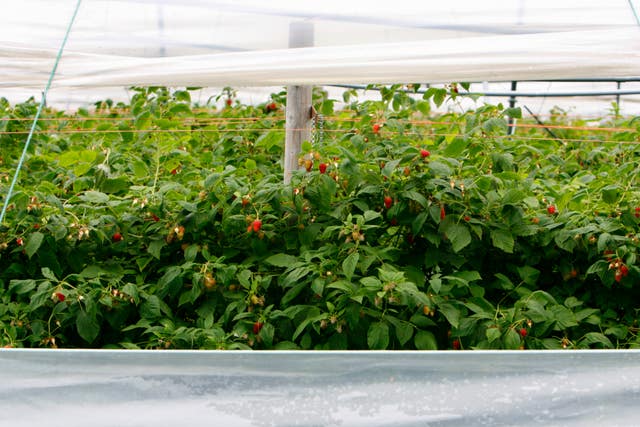Expanding UK fruit and veg growing ‘could add £2.3bn to the economy’
Green Alliance said the £5 billion horticultural sector accounts for 9% of the total contribution agriculture makes to the economy.

Boosting UK fruit and veg production to meet healthy eating guidelines could increase farm profits, create jobs and add £2.3 billion to the economy, a report has suggested.
A study by environmental think tank Green Alliance warns that intake of fruit and vegetables would need to increase by 86% for Britons to meet health advice to eat five portions a day, with just a third of people in the UK eating the recommended amount.
But helping the domestic horticulture industry expand in line with people eating the right amount of fruit and vegetables could add £2.3 billion to the economy – or more if the proportion of produce that was homegrown increased.
It could also support up to 23,520 additional jobs and boost farm incomes by 3% across the country, without threatening self-sufficiency in other foods, the report said.

The researchers estimatd 113,622 hectares of land (281,000 acres) would be needed to expand horticultural production by 86%.
That is less than the 133,000 hectares used to grow crops for bioenergy, which the think tank argues is an “extremely inefficient” way of generating energy, producing 100 times less energy than solar per hectare, and which has to be subsidised to make it viable.
Green Alliance also said the £5 billion horticultural sector accounts for 9% of the total contribution agriculture makes to the economy, but uses less than 1% of the UK’s farmland.
The beef and lamb industries combined are worth 1.9 times more to the economy, but use 76 times more land, the think tank said.
The report said prioritising the horticultural industry makes sense, given the pressure on land to meet food security, climate, energy and nature demands.
It called for a new horticultural strategy from the Government to increase demand and supply of domestically produced fruit and vegetables, which would address barriers including high energy prices, unfairness in supply chains and retailers disproportionately profiting from unhealthy food.
It also recommended removing subsidies for bioenergy crops and working closely with the new land use framework to identify areas for horticulture to avoid ploughing up lowland peat which would release more carbon emissions.
The £2.3 billion estimated boost to the economy is based on an assumption that if fruit and veg consumption grew, the proportion that was imported would remain steady.
If the UK became 10% more self-sufficient in fruit and vegetables that could deliver an extra £3.3 billion to the economy, the report said.
Lydia Collas, head of natural environment at Green Alliance, said: “We need to eat more fruit and vegetables to improve our health.
“But if we don’t grow more of them here, we’ll let profitable horticulture and the jobs it could support go elsewhere.
“We currently import more than half of our apples when we have everything we need to eat British apples year-round.
“If the Government is serious about improving people’s health and ensuring farmers have sustainable livelihoods, it needs a horticulture strategy.”
A Defra spokesperson said: “Our commitment to farmers and growers remains steadfast.
“That’s why this Government is investing £5 billion into farming, the largest budget for sustainable food production in our country’s history, and is going further with reforms to boost profits by backing British produce.
“Our cross-Government food strategy will make sure our food system can continue to feed the nation, realise its potential for economic growth, protect the planet and nourish individuals, now and into the future.”





